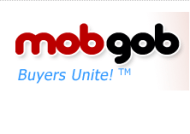
Group buying site Groupon is suing one of the many small startups trying to emulate its successful social shopping model over a patent that was originally filed over a decade ago. The target of the lawsuit is MobGob, which enables people to use their existing social networks to gather their purchasing powers and collectively buy goods or services from sellers online. The complaint is embedded below.
Groupon alleges that MobGob infringes one of its patents by operating a system for aggregating demand for the purchase of a product by a number of individual buyers.
MobGob, as many group buying sites these days, allows sellers to provide a conditional sales offer for a product or service and set a price depending on the aggregate amount of acceptances of the conditional sales offer made in a specified and limited time.
Groupon claims MobGob knowingly infringes one of its patents, no. 6,269,343, entitled “On-line marketing system and method”, causing them harm to their business, market, reputation and goodwill. Groupon is asking for the company to stop infringing on this patent and to hand over “all infringing products and systems in their possession”, including the MobGob website, for destruction.
The description of the patent-in-suit reads:
The present invention provides a method and system that allows sellers to communicate conditional offers to potential buyers. The conditions include prices that depend on the aggregate amount of goods or services that buyers collectively agree to purchase by a given time and date.
The invention facilitates “demand aggregation”, that is, aggregating demand by potential buyers (who may or may not know each other), for products offered by sellers. This invention allows sellers conveniently to offer “Demand-Based Pricing”, that is, prices which go down as the volume of units sold in any given offer goes up.
A seller can therefor offer volume discounts to buyers acting as a group, even when the buyers may not have any formal relationship with one another.
What I found interesting about this lawsuit is that the patent was first filed back in 1999 and issued two years later, while Groupon is only three years old. The inventor listed is Matthew Pallakoff, currently in charge of mobile UI / UX for digital products at Barnes & Noble, and the company that the patent was assigned to is MobShop (not this one).
MobShop was in fact an early group buying site that raised a ton of money from entrepreneur-turned-VC Marc Andreessen and Mayfield Fund at the hight of the early-century Internet boom and unceremoniously folded in 2001, almost as quickly as it had risen.
I was curious to know whether Groupon somehow got hold of the patent through acquisition, which is particularly interesting given that they’re now filing lawsuits against smaller rivals based solely on the possession of the patent. Reached by email, Groupon founder and CEO Andrew Mason told me that it’s a “funny story” – I’m still waiting for him to get back to me and tell me what it is (will update if and when he does).
Update: so basically, Mason told me that the reason they’re suing MobGob is because they actually tried to patent-troll-sue Groupon first, under another name and with a patent that was issued at a later time than the patent-in-suit.
He added that Groupon has absolutely no intention of going after companies in the group buying space, but that they bought the early MobShop patent to protect themselves in “crazy lawsuits” that get filed against them now that they’re in the picture so much.
In other words, he says they bought the patent for usage in lawsuits filed against them, not with the intention to sue other group buying services.
(Thanks to patent news site Priorsmart for the heads up)
